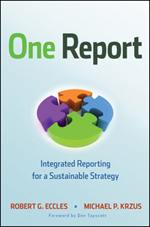Harvard Business School's Robert Eccles Makes the Case for Integrated Reporting
 Robert G. Eccles
Robert G. Eccles
BOSTON — In a business world chastened by the financial collapse and the Great Recession, companies are being held to a higher standard of transparency than ever before - not only about financial performance but about nonfinancial performance regarding environmental, social, and governance (ESG) issues. In short, for both internal and external stakeholders, transparency and corporate responsibility are the orders of the day, say Robert G. Eccles of Harvard Business School and Michael P. Krzus of Grant Thornton LLP, coauthors of the new book One Report: Integrated Reporting for a Sustainable Strategy (Wiley). Thanks to their integrated reporting approach, it is now much easier for companies to demonstrate their progress in these areas. VIDEO INTERVIEW: Watch an interview with One Report authors Robert G. Eccles and Michael P. Krzus. "Many companies today supplement their annual report with a voluntary 'Corporate Responsibility' or 'Sustainability' report," says Eccles. "To have a real impact, however, these separate documents need to be integrated, demonstrating that the company has a sustainable strategy based on a real commitment to corporate social responsibility and that the firm takes into account the needs of all stakeholders." "An excessive focus on short-term financial performance must be replaced by a longer-term view that a sustainable company depends upon its contribution to a sustainable society," adds Krzus. "One essential mechanism for achieving that is a commitment to more integrated external reporting." One Report: Integrated Reporting for a Sustainable Strategy is a guide to achieving that goal, providing insights on the "how" of integrated reporting (known as One Report) and making the case for its adoption worldwide. Integrated reporting communicates to shareholders and other stakeholders that the company takes a holistic view of their interests - a concept demonstrated even more clearly by the company's willingness to be a "listener," not just a "talker," through Internet dialogue it establishes with stakeholders. Finally, integrated reporting commits a company to a path of continuous improvement in external reporting. 
Companies can reap real benefits from One Report:
Reporting is the world's window to a company - and companies that are currently practicing One Report (including the Dutch lighting and health care company Philips, the Danish pharmaceutical company Novo Nordisk, the Brazilian cosmetics and fragrances maker Natura, and U.S.-based United Technologies Corporation) are beginning to see positive results. About the Authors Michael P. Krzus is a public policy and external affairs partner with Grant Thornton LLP, the U.S. member firm of Grant Thornton International Ltd, one of the six global audit, tax and advisory organizations. Mr. Krzus is the firm's global expert on improving corporate reporting and has represented Grant Thornton in U.S. and international business reporting initiatives. |
About Harvard Business School
Harvard Business School, located on a 40-acre campus in Boston, was founded in 1908 as part of Harvard University. It is among the world's most trusted sources of management education and thought leadership. For more than a century, the School's faculty has combined a passion for teaching with rigorous research conducted alongside practitioners at world-leading organizations to educate leaders who make a difference in the world. Through a dynamic ecosystem of research, learning, and entrepreneurship that includes MBA, Doctoral, Executive Education, and Online programs, as well as numerous initiatives, centers, institutes, and labs, Harvard Business School fosters bold new ideas and collaborative learning networks that shape the future of business.
